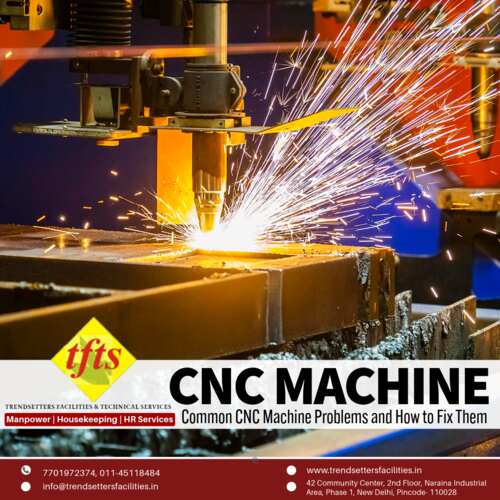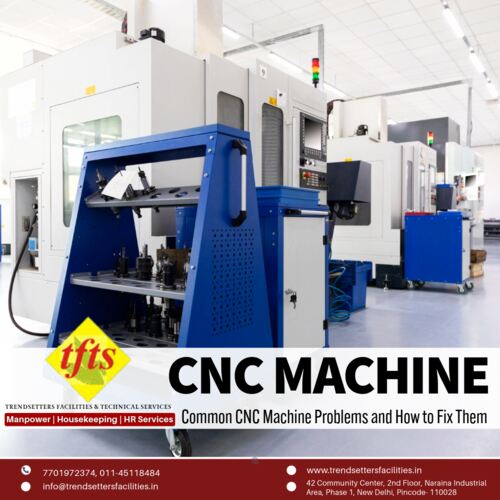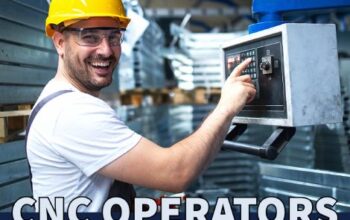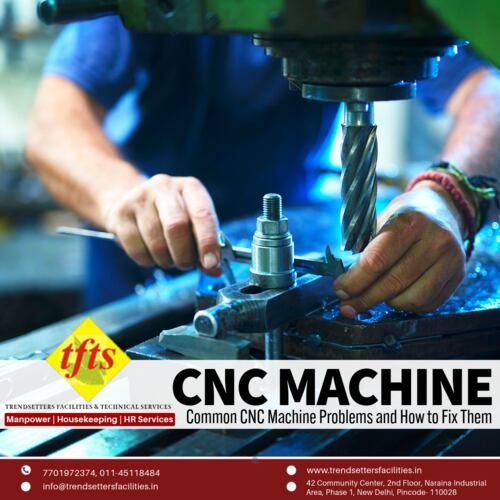
CNC (Computer Numerical Control) machines have revolutionized the manufacturing industry by improving precision, consistency, and efficiency. From automotive to aerospace and metal fabrication, these machines perform complex tasks with minimal human intervention. However, even the most advanced CNC systems can face technical or operational issues that interrupt production and affect quality. Understanding common CNC machine problems and knowing how to fix them can save both time and costs while maintaining optimal performance explains TFTS which is India’s top certified CNC machinists providers for SME and MSME industries in this blog.
What is a CNC Machine?
A CNC machine is an automated tool controlled by computer programs that dictate the movement of machinery and cutting tools. Instead of relying on manual operation, CNC machines follow pre-set digital instructions—known as G-code—to cut, drill, mill, or shape materials like metal, wood, and plastic. These machines are known for their precision and repeatability, which make them essential in modern manufacturing says Mr. Atul Mahajan, Director of Trendsetters Facilities and Technical Services who are providing experienced CNC operators in India.
While CNC machines reduce the margin of human error, they require proper setup, maintenance, and monitoring to avoid breakdowns. Let’s explore some of the most common CNC problems and their solutions.
1. Tool Wear and Breakage
Problem:
One of the most frequent CNC issues is tool wear or breakage due to prolonged use, incorrect feed rates, or improper tool selection. Dull tools reduce accuracy and cause rough finishes.
Fix:
Regularly inspect cutting tools for signs of wear and replace them as needed. Use the correct tool type and speed for each material. Implement a tool maintenance schedule and monitor spindle load to detect early signs of tool stress.
2. Machine Vibrations or Chatter
Problem:
Excessive vibration, also known as chatter, can damage both the tool and workpiece, leading to poor surface quality and dimensional inaccuracies.
Fix:
Check for loose bolts, unbalanced tools, or incorrect cutting speeds. Secure the workpiece properly and adjust spindle speed or feed rate to minimize vibration. Ensuring a rigid setup and using vibration-dampening materials can also help.
3. Inaccurate Positioning or Dimension Errors
Problem:
If the finished product does not match the programmed dimensions, it may be due to calibration issues, backlash in machine components, or thermal expansion.
Fix:
Regularly calibrate the machine’s axis and check for mechanical looseness. Keep the machine clean from chips and debris, which can affect movement. Also, allow the machine to reach its normal operating temperature before precision machining to reduce thermal effects.
4. Overheating
Problem:
CNC machines operate under high speeds and loads, generating significant heat. Overheating can damage motors, spindles, or control systems.
Fix:
Ensure proper coolant flow and clean filters regularly. Maintain optimal lubrication in moving parts. Avoid overloading the machine and give it adequate rest periods during long production runs. Monitor temperature readings through the control panel for early detection.
5. Communication and Software Errors
Problem:
Errors in G-code, corrupted files, or communication failures between the computer and CNC controller can cause sudden stops or incorrect operations.
Fix:
Double-check program codes before running them. Keep software updated and back up all critical files. If communication fails, inspect cable connections and ports. Using reliable CAM software and verifying tool paths in simulation can prevent costly mistakes.
CNC machines are vital for high-precision manufacturing, but consistent performance depends on regular maintenance and proper operation. By identifying and fixing these common CNC problems early—such as tool wear, vibrations, calibration issues, overheating, and software errors—you can extend machine life, improve productivity, and ensure flawless output. Prevention, rather than reaction, remains the key to keeping your CNC machines running efficiently and profitably.
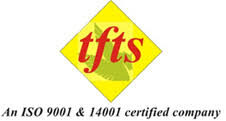
Trendsetters Facilities & Technical Services (TFTS) is India’s leading manpower & temporary staffing agency for the manufacturing, power, hospitality, automobiles, IT, and Banking sectors. At present TFTS is the leading manpower supplier to Indian SEZs in SIDCUL, Rudrapur, Udhampur, Haridwar, and JAIPUR World. Some of the prestigious TFTS clients are Delhi Metro Rail Corporation, Bajaj Automobiles, Reliance Infrastructure, Haldirams, HCL.
Trendsetters Facilities & Technical Services (TFTS) offers a range of high-quality services from a team of specialized technicians for –
Life Maintenance and Repair
Housekeeping Services for Homes, Offices, Industries, and Institutions.
HR Outsourcing
Payroll outsourcing services
ITI Certified CNC Operators
Certified TIG welders,
Marble polishing services,
Fire hydrant system maintenance and more.
To Get Quotes
Call Us at : 7701972374, 011-45118484
Email: info@trendsettersfacilities.in
